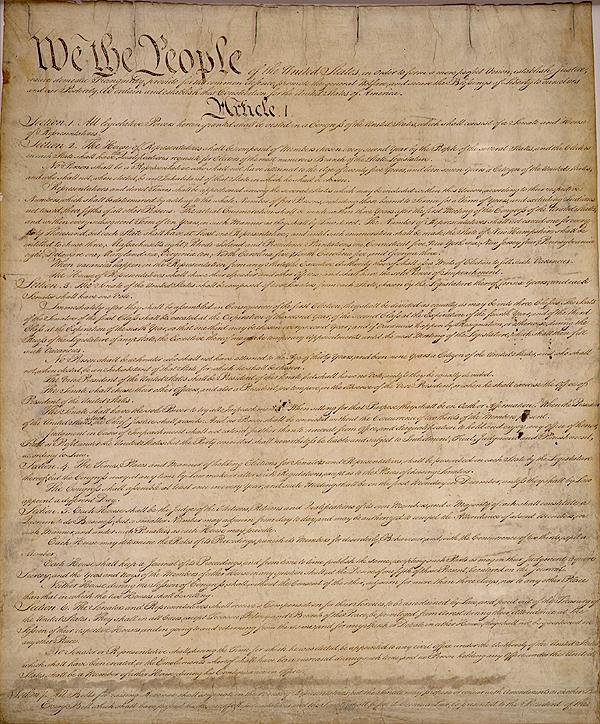Candidate Trump Leaned on Michigan Canvassers to Deny Civil Rights
[NB: check the byline, thanks. / ~Rayne]
Yesterday The Detroit News reported Donald Trump and GOP party chair Ronna Romney McDaniel pressured Wayne County canvassers Monica Palmer and William Hartmann on November 17, 2020 to refuse to certify the election results.
The source of the recordings on which Detroit News based their report is not clear.
~ ~ ~
There’s conjecture this may have been material from the House January 6 Committee obtained from McDaniel’s own cell phone.
However the wording of the Detroit News article puts some distance between McDaniel and the recording, making it more likely the source was in the same space with the canvassers:
“We’ve got to fight for our country,” said Trump on the recordings, made by a person who was present for the call with Palmer and Hartmann. “We can’t let these people take our country away from us.”
Emphasis mine.
The distancing was even more pointed in the following paragraph, describing what sounds more like protecting a source from organized crime operations:
The News listened to audio that was captured in four recordings by someone present for the conversation between Trump and the canvassers. That information came to The News through an intermediary who also heard the recordings but who was not present when they were made. Sources presented the information to The News on the condition that they not be identified publicly for fear of retribution by the former president or his supporters.
Could this have been McDaniel’s work? Sure. Why was this released now, especially when she continues to defend her role at that time?
If it was from the J6 Committee, again, why now, and why the protections for the source?
Detroit News matched the recordings with the J6 Committee’s records:
The timestamp of the first recording was 9:55 p.m. Nov. 17, 2020. The time was consistent with Verizon phone records obtained by a U.S. House committee that showed Palmer received calls from McDaniel at 9:53 p.m. and 10:04 p.m.
This suggests the source wasn’t Palmer nor the J6 Committee. Detroit News also reported they checked with Palmer:
Palmer acknowledged to The News that she and Hartmann took the call from Trump in a vehicle and that other people entered the vehicle and could have heard the conversation. She said she could not, however, identify who entered the vehicle or might have heard the conversation.
Palmer told The News repeatedly that she didn’t remember what was stated on the phone call with McDaniel and Trump.
There’s another possible source which might prove difficult to validate: the older of the two GOP canvassers, William Hartmann, died in 2021. It’s possible this was a recording he made as an aid to prepare a document he used to attempt to reverse his certification of the vote. Was this recording released by someone associated with his estate? With the buffer placed between Detroit News’s report and the source, it’s tough to say.
While Detroit News checked with Trump campaign spokesperson Steve Cheung about the recordings, Cheung said,
Steven Cheung, a Trump campaign spokesman, said Trump’s actions “were taken in furtherance of his duty as president of the United States to faithfully take care of the laws and ensure election integrity, including investigating the rigged and stolen 2020 presidential election.”
“President Trump and the American people have the constitutional right to free and fair elections,” Cheung said.
The Hill also followed up with Cheung while reporting on this same story:
In an emailed statement to The Hill, Trump campaign spokesperson Steven Cheung said “[a]ll of President Trump’s actions were taken in furtherance of his duty as President of the United States to faithfully take care of the laws and ensure election integrity, including investigating the rigged and stolen 2020 Presidential Election.”
Wow. It’s as if Cheung was using a prepared script.
It’s a problematic script since the Executive Branch protects voters’ civil rights through the Department of Justice’s Public Integrity Section’s Election Crimes Branch with regard to and through the Civil Rights Division. These functions are supposed to act independently of the White House, and definitely without regard to a candidate or party.
Nothing in this story by either Detroit News or The Hill indicates Trump told the canvassers he was asking for an investigation into possible voter fraud by the DOJ or Michigan’s secretary of state and state attorney general. He and McDaniel simply leaned on two white MIGOP canvassers partially responsible for certifying a huge chunk of the state’s votes.
Worth noting the Wayne County board of canvassers’ meeting on November 17 ran from 6:00-9:32 p.m.; Trump is not mentioned specifically during the meeting. Palmer alone says she’s uncomfortable certifying the city of Detroit.
Which suggests Hartmann wasn’t initially obstructing the certification before Trump and McDaniel’s phone call 23 minutes after the canvassers’ meeting.
~ ~ ~
There are a few more points which should be taken into consideration with regard to the Detroit News’s report.
– Each of Michigan’s 83 counties has a bipartisan four-member board of canvassers; each board is split 50-50 between GOP and Democratic Party members. The two canvassers Trump called are white MIGOP members who represent Wayne County. If you’re from the Detroit Metro area you already know these two canvassers already provide over weighted representation to white voters as Wayne County is a minority-majority county with whites composing less than 48% of the county’s population.
– Trump’s use of the phrase, “”We can’t let these people take our country away from us” during the phone call is a dog whistle racist plea to white MIGOP members not to allow a minority-majority county decide the election for Joe Biden. Emphasis mine; “you people” and “these people” are phrases often used to reinforce othering of non-whites.
– The number of votes which would have been affected by Palmer and Hartmann’s refusal to certify was more than 1.4 million, or nearly 20% of Michigan’s total active registered voters (7.15 million in November 2020). Wayne County is the most populous in Michigan, which may explain why pressure was placed on Wayne and not a formerly-red-trending-blue county like Kent, home to Grand Rapids.
– The Detroit News is a right-leaning news outlet; the source did not choose to share the recordings with the left-leaning Detroit Free Press, a Gannett-owned outlet, nor did they go to the Lansing State Journal in the state’s capital city (also a Gannett outlet) or the right-leaning political news outlet Gongwer.
– The report was published a week after preliminary court hearings were held in relation to criminal charges filed against MIGOP fake electors who attempted to throw the election for Trump with a forged certification. The electors are established MIGOP members who held roles within the party’s apparatus at the time of the election.
– After the call to the Wayne County canvassers, Trump summoned Michigan state legislators Mike Shirkey and Lee Chatfield, who at the time were the state senate majority leader and the state house speaker respectively; they were to meet with Trump in Washington DC on November 19. In testimony before the House J6 Committee, Shirkey said Trump didn’t make an explicit ask of the two legislators but instead trash talked about Wayne County and parroted unsubstantiated voter fraud claims. Trump also hosted a conference call with the two state legislators and both Rudy Giuliani and Ronna McDaniel during which Giuliani continued the false claims of voter fraud. Trump made multiple calls to Shirkey after the legislators’ visit to DC as well as tweets – a social media post on January 3 included Shirkey’s personal phone number resulting in more than 4,000 text messages.
– There is a schism within the MIGOP which may have encouraged the release of the recordings to the Detroit News. Trump-y former Michigan secretary of state candidate and current MIGOP chair Kristina Karamo has been under fire for mismanagement of the party’s finances and violations of election laws. A faction of the party has been trying to remove her as chair. How much of the party’s problems may be related to Trump’s support of losing-candidate remains to be seen; she has not been able to raise sufficient funds to support the party and pay its debts.
~ ~ ~
Trump meeting directly with state legislators in an effort to pressure the state to overturn the 2020 election looks as much like legitimate protection of voters’ civil rights as the phone calls to the Wayne County canvassers — as in not at all legitimate.
It looks like additional evidence of an attempt to deny the civil rights of a majority of Michigan voters in 2020 — violating 18 USC 241 just as Trump was charged by Special Counsel — with special animus toward the minority-majority community of Wayne County — including the city of Detroit.
Is the trashing of the MIGOP’s finances and operations by a Trump-endorsed former SOS candidate payback for failing to deliver the state by denying those rights? Is it a twist of the shiv that a Black MIGOP chair is destroying the state party?
______
(h/t to harpie for the article link in comments)





